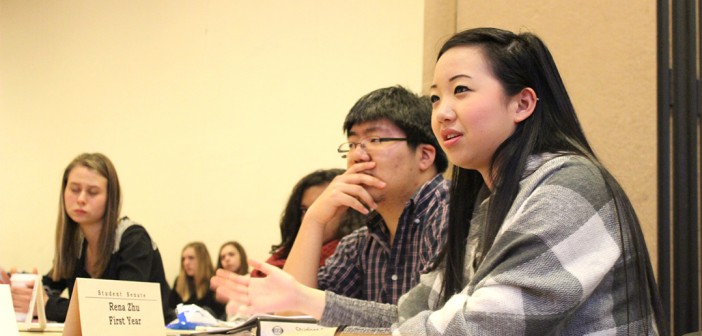Editor’s Note: An earlier version of this article incorrectly stated that the Funding Cut Rational, which did not pass, concerned Student Senate’s ability to stop funding for a club. That portion of the guidelines specified reasons in which funding could be decreased, but funding cannot be fully stopped. Student Senate does not have the authority to defund clubs. It was also incorrectly stated that Annika Ellenbogen has worked on the new guidelines for a year. She has been working on the guidelines for more than a year and a half.
—
After a year and a half of work and some deliberation, Student Senate passed a new set of funding guidelines at its Feb. 23 meeting.
The new funding guidelines will change the way funds are allocated to clubs.
The new guidelines classify clubs based on complexity of events, scope of programming and risk to the university, Student Senate treasurer Joe Mitri, ’17, wrote in an email. Clubs were organized previously into major clubs, like University Productions, and minor clubs, like the German Club, but they are now organized as sponsored, affiliated and registered organizations, Student Senate president Anna D’Ginto said. Clubs can move between the three classifications.
Previously, all clubs, whether major or minor, had to apply in March for Senate funding for the following year, D’Ginto said. With the new system, only sponsored organizations will be submitting a budget for the upcoming academic year, and this allows clubs to have more flexibility.
Affiliated and registered clubs will receive an annual allocation and will have the ability to apply for additional funding as needed throughout the year, D’Ginto said.
“After hosting open sessions with clubs and Senate, we received a lot of positive feedback in favor of this new system, because it emphasizes giving clubs the freedom to program as they wish,” Mitri wrote.
While the majority of the funding guidelines was passed by Senate, the Funding Cut Rationale portion of the guidelines was not passed. Student Senate moved to separate the new guidelines from the Funding Cut Rationale, which D’Ginto said was a controversial part of the bill. This section of the guidelines outlines instances in which the Student Senate Allocations committee can “reduce a club’s funding,” according to the document.
Matt Rothberg, ’18, and Senate parliamentarian Annika Ellenbogen, ’18, approved of the new funding guidelines but did not approve the Funding Cut Rationale.
“There definitely needs to be a funding cut rationale, we just need to come up with that rationale and come up with it so its fair and concise,” Rothberg said.
D’Ginto said she believes the Funding Cut Rationale was not passed because members of Student Senate need to discuss it more thoroughly.
“I think the purpose (of the Funding Cut Rationale) got misconstrued in the debate in my opinion,” D’Ginto said. “I think that’s largely what happened. It’s very technical. . . But I think that once you understand the issue and understand what it’s actually talking about, you realize that it’s not radical at all. It’s just a very simple line saying that Senate can’t cut funding unless you break the rules.”
D’Ginto said Student Senate’s bylaws state that there must be “significant progress” on an item before it is reintroduced to Senate, and the group will work to introduce and pass a new version of the Funding Cut Rationale in the future.






Comment policy
Comments posted to The Brown and White website are reviewed by a moderator before being approved. Incendiary speech or harassing language, including comments targeted at individuals, may be deemed unacceptable and not published. Spam and other soliciting will also be declined.
The Brown and White also reserves the right to not publish entirely anonymous comments.
1 Comment
Pingback: Autobiographical Essay, 500 words about journalism and me | Do You Wanna Be My Friend?